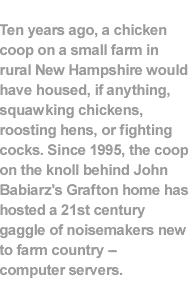 |
|
||||||||||||

|

|
|
By Lisa Rogak
|
When John Babiarz slides back the steel door of the chicken coop behind his Grafton, N.H., home, he lets loose a ruckus -- the hum and electric buzz of Internet servers and the raspy, shrill chirp of modems admitting his customers to the world of the Web. Ten years ago, a chicken coop on a small farm in rural New Hampshire would have been used, if at all, as a chicken coop, but today Babiarz uses it to house his one-man Internet Service Provider, Endor Communications. In 1993, Babiarz moved to Grafton from Connecticut, where he worked as a database consultant. He founded Endor in 1995 to keep in touch with his clients in the New York metro area, where he still does database consulting, and to be able to transfer large database files. Babiarz taught himself how to set up an ISP and recruited a few friends in town to share the costs of the connection in exchange for Internet service. Once Babiarz was sure that both the equipment and the connection were reliable, he opened for business as an ISP, the only one in the area that didn't require a toll call for access. In a rural area where the phone company might consider a call to an adjacent town long distance, Babiarz offered clients Internet access to the far reaches of the globe for the price of a local call. An IP-ISP from the start, Babiarz is (one dedicated T1 line, 84 phone lines and 460 customers later) still an IP. Even though other ISPs of roughly Endor's size often have at least one full-time employee, Babiarz runs Endor without help. Organization is the key, he says. For instance, Babiarz doesn't like to spend valuable time sending out invoices to customers, so he automated his billing process by writing software to do it for him. He also designed Endor's network with a mainframe, which he considers more stable than a system of servers and modems, and he built certain redundancies into the network. For one, he hooked up the system to an uninterruptible power supply (UPS) with a six-hour battery in case of a power outage (not uncommon in the countryside). He's also connected a couple of servers to the network in case the mainframe goes down. These redundancies also help to reduce the time he must spend doing tech support, the most time-consuming aspect of his business, he says. "In theory, with a service business like an ISP, you need to have people to answer the phone during the times when most customers will have problems, which in my case is during the day and the early evening," he says. "If you have good equipment, then you don't have the phone calls and you can be independent. I can't afford to babysit my business." Like tech support providers everywhere, Babiarz has stories about Internet novices who expect everything to be done for them. "In the beginning, I would go out to a customer's home to set up the computer," he says. "Now I usually walk through it with them for fifteen minutes over the phone. But as people are getting more powerful computers, they're getting more confused. You don't know how many times I want to tell people to just put it back in the box and send it back to the company." Lone Ranger Babiarz hits the ground running at 5 a.m. and doesn't stop until around ten o'clock at night. "Whenever I start a new project, I always ask myself, what will it take for me to get from start to finish without having to involve anyone else?" he says. "I'm an independent professional because I can control my own projects that way. I'm very demanding. The job has to be done right, and it's not going to happen with an employee unless he's really into it." How would an employee deal with customers who want something for nothing, for example? In the ISP business, these types camp out online all day long, preventing other customers from getting through during hours of high-traffic. The heavy users compromise Endor's profitability. To dust off the loiterers, Babiarz configured his software to disconnect users after nine minutes of inactivity. "In order to have an incoming line for an ISP, I need a commercial line, which in New Hampshire costs $35 a month," he says. "If someone camps out for the entire day, I'm losing money because they're only paying 80 cents a day -- but I'm paying the phone company $1.05 a day. And that's just the connection cost, it doesn't include the cost of the equipment or my time." Although he plans to add another local telephone exchange to his access pool and to increase the number of customers for whom dial-up access to Endor is now a local call, Babiarz expects to be able to handle the increased workload by himself. With a greater volume of business "my workload should increase," says Babiarz, "but as more people are using Windows 98 -- which is more stable than Windows 95 was -- the number of tech support calls is reduced." The less tech support he has to provide (a pro bono service) the more time he can devote to other aspects of his chicken-coop ISP. Babiarz is highly skeptical that an employee would be helpful. "It would take a very special kind of person who could walk in here and regard my customers the same way I do," he says. "And with a pool of workers this narrow -- the unemployment rate in New Hampshire stands at just over two percent -- finding that person becomes very difficult. "I work longer hours, and I work much harder than I ever did, but I always have the option of walking out the door and looking at the mountains or tending to the chickens." Ah, Yes, The Chickens Between the tech support calls that do come in, bookkeeping, and maintaining the equipment, Babiarz tends to the five pigs and 40 chickens he keeps in another, unconverted chicken coop just behind the ISP coop. And in yet another of several abandoned chicken coops on his 20 acres, Babiarz plans to start a hydroponic farming business. He says that he and his wife picked Grafton, located 30 miles southeast of Dartmouth College, in Hanover, because it's small enough to hide out in. "In a town like this, they'll leave you alone," he says. Most people who pass through Grafton wouldn't imagine that there are many IPs living here on the back roads doing high-tech work, but "the talent out here is amazing," Babiarz says. "There are people designing circuit boards and others who telecommute who send files back to the home office all day long." If they wanted to, some of these people could easily afford a fancier address. "Several of my customers ride the computer all day and are making money hand over fist," he says. "You would never know it by looking at them. If it wasn't for the Internet, this would be a really sleepy town." | ||||
|
| |||||
|
July 7, 1999 Edited by Eric Gershon Illustration by Lawrence San Production by Keith Gendel |
We'd love to hear your comments about this article! Lisa Rogak is a freelance writer who lives in New Hampshire. She has written for New York, Men's Journal, and many other magazines, and is the author of The Complete Country Business Guide (Williams Hill Publishing, 1999). | ||||
|
| |||||
The 1099 name and logo are trademarks of 1099 Magazine.